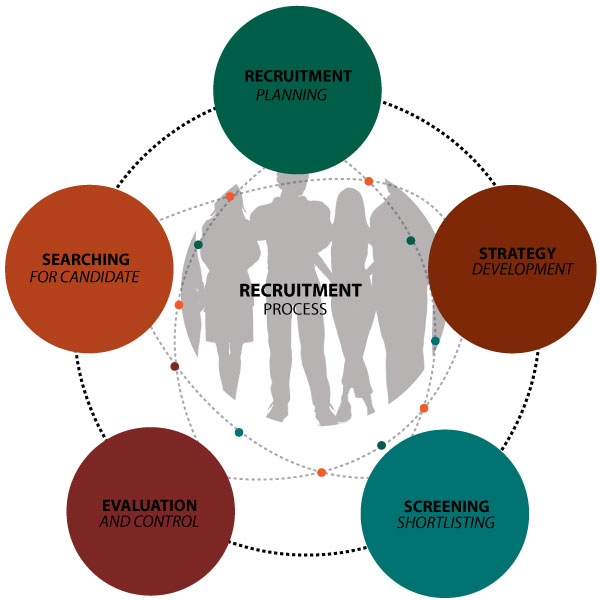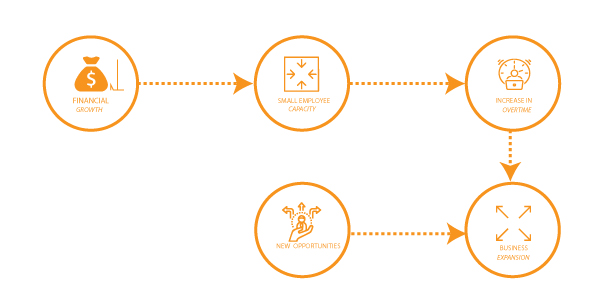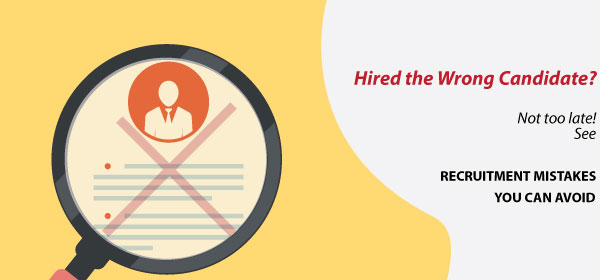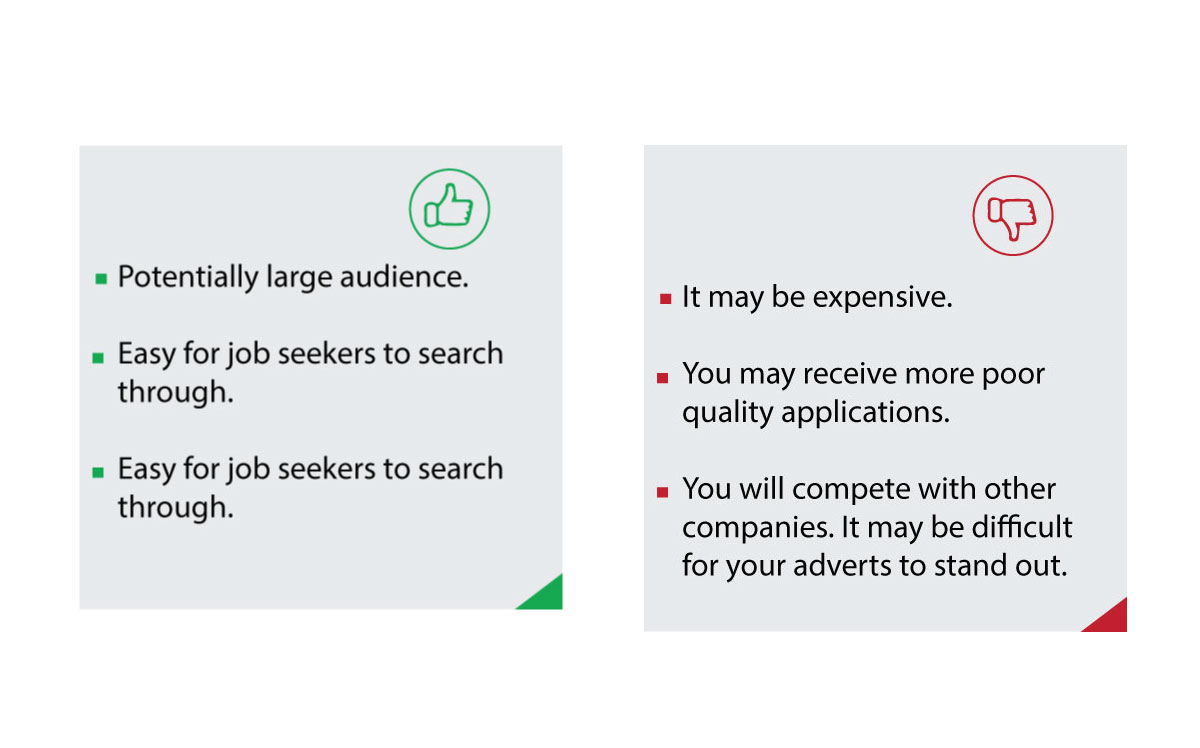If you own a small business, then your recruitment goal is simple: Find people that are capable of filling your vacant positions and get them to start work.
As simple as this goal looks, how easy is it to achieve?
The recruitment process is not ‘a walk in the park’ thing for small business owners. It can be a tedious and tiresome process.
Without an allocated in-house HR team, getting your job adverts in the face of job seekers, scanning through CVs, reading loads of cover letters and finally communicating with candidates can seem like an everlasting task.
This is why it is important for small business owners to set-up a formal recruitment process.
Do you know that the cost of recruiting a wrong hire is far higher than the cost of hiring a great fit? In fact, you could lose as much as $7, 000 to $10, 000 just by hiring the wrong person depending on the role.
While some hires may add value to your business, others may contribute to making the business sink. This is why business owners should be thoughtful about their recruitment process. That is why we created this article to help you.
In this guide, we will be looking at how small business owners can hire the smart way considering the following:
Recruitment is the process of attracting, shortlisting, selecting, and hiring suitable candidates for jobs within the organization. Recruitment involves the entire process, from identifying the need for a vacancy to on-boarding the new hire.
Recruitment refers to the overall process of attracting, shortlisting, selecting and appointing suitable candidates for jobs within an organization
Recruitment simply has to do with identifying a vacant position, then getting qualified people to fill that position. As simple as this definition is, it requires a process to get the required result (getting qualified people to fill the position).
This is what we refer to as a recruitment process. (which will be discussed later in this guide).

It is important for any business to set-up a recruitment process to guide them to recruit the right people for their vacancies.
Before we talk about the importance of setting up a recruitment process, it is good for us to first understand what a recruitment process is.
What is a recruitment process?
A recruitment process refers to the steps that an organization would have to follow to ensure they hire the best person for the job. A recruitment process is a process of organizing the job vacancy, analyzing the recruitment, scanning through job applications, shortlisting and finally selecting the best candidate.
For a business to recruit successfully, the business has to follow these steps:
The first stage involved in recruitment is planning. Recruitment planning involves the following: Understanding the need for the job position, Drafting a comprehensive job specification for the vacant position, outlining the responsibility, skills, experience, and qualifications needed, pay grade, starting date, employment type, employment condition, etc.
All these are factors that should be considered in relation to the particular role that you are recruiting for.
Note: Recruitment planning should start even before you advert the vacant position.
Strategy Development
After you have planned your recruitment and discovered the qualification of the candidates, the next step is for you to devise a strategy for recruiting candidates to fill the vacant positions that you have identified.
You should consider the following when planning your recruitment strategy:
All these questions are questions that you have to answer when you are setting up a recruitment strategy.
Setting up a recruitment strategy may not be an easy thing to do, but having the right strategy will help you attract the right candidates. These are the following steps involved in developing a recruitment strategy:
Searching For Candidates
This stage involves the process of attracting job seekers to the organization. There are broadly two sources that can help you attract candidates which are:
Internal sources: Internal sources of recruitment refers to hiring employees within your organization through the following:
External sources: External sources of recruitment refers to hiring an employee outside your organization through the following:
Screening/Shortlisting
Screening starts after you have successfully decided on the medium you want to use to source for candidates. Screening is the process of filtering candidates’ applications for the further selection process.
To successfully screen and shortlist candidates, you will have to follow these processes:
In this process, you would have to review and check the candidates’ education, work experience, and overall background matching the requirement of the job.
Conducting a telephone interview is the second step in screening candidates. In this process, after screening the candidate’s CV, the candidates are contacted through phone or video by the hiring manager.
This process helps you verify whether the candidate is active and available to work.
It will also help you get a quick insight into the candidate’s attitude, ability to answer interview questions, and communication skills.
Identifying the top candidates is the final step in the screening process. In this process, you select the top resumes. Selecting the top resumes will make it easy for you to make decisions.
This process will help you do the following:
Evaluation and Control
Considering the cost involved in the recruitment process, it is important to evaluate the processes and strategies that you have used throughout your recruitment plan and set up control measures.
Evaluation simply has to do with checking how effective your recruitment strategies are in comparison to the cost of recruitment. Control has to do with setting up solutions to curb whatever problems or challenges that you would likely encounter.
Looking at all the processes that are involved in recruiting a candidate, you may want to ask the big question;
why is setting up a recruitment process important for my business?
Just like we said earlier, hiring the right candidate can be the push you need to move your business to greater heights and hiring the wrong candidate can be the single simple mistake that might make you watch everything you have worked for crash down.
To ensure you maximize the resources that you would have to invest to hire a candidate, it is good for you to set up a recruitment process.
A good recruitment process will save you time and resources while setting the platform for a smooth selection process.
You achieve the following when you set up a recruitment process:
1. You will find quality candidates
Having great employees is the number goal of any business whether large or small. Setting up an effective recruitment process can make your dream of hiring the best candidate for your position a reality.
Setting up a recruitment process helps you plan for the position you want to fill by;
You may feel like you can hire anyone when you want to hire, but setting up a recruitment process will work you through the hiring process.
For example, “if you are a furniture worker and you need to hire a digital marketer that will help promote your product on the internet, what would you do?”
Would you go ahead and employ any digital marketer that you can see, without knowing if the person is good or not.
Or
Would you rather sit down and carefully create a recruitment process that will address the fact that you don’t understand digital marketing, and still help you hire a good candidate regardless?
It is up to you to make your choice depending on how far you want your business to grow.
2. It will save you time and money.
Going through the process of setting up systems (like setting interview questions, creating a skills test, etc.) to determine if the candidate will be able to do the job will eventually save you time and resources. You want to know how?
Setting up a logical process that candidates will have to follow before they can finally be selected will ensure that you select candidates based on defined metrics rather than emotions or feelings. Candidates that are selected based on defined metrics will end up becoming a great fit for the position.
Hiring the right candidate will save you the time you will spend replacing an employee over and over after a bad hire. Employing the right candidate through defined means will also save you the resources of training multiple candidates for the same position without results.
There are costs and time spent putting out job vacancies, screening and training new people. Taking the time to choose properly the first time helps minimize this risk.
3. Helps build your brand/ reduce the risk of legal-related issues
If you have a systemic recruitment process that you follow when you want to recruit any candidate, it will help you to conduct a free and fair candidate selection process that will affect how candidates will see your company.
If candidates know that your recruitment processes are clear and free from any form of discrimination or recruitment malpractice, they will be attracted.
Setting up a systemic process will help you prevent legal issues like; asking a personal question during the interview, being bias in your selection process that may lead to disqualifying a qualified candidate.
Keeping your interview process professional can help prevent some legal recruitment issues.

As a business owner, it is important for you to get the timing right when it comes to hiring a new employee.
There are negative effects when you hire a new employee too early or too late. It is good for you to get the timing right if you want to achieve your organizational goal.
If you hire too soon, your profit can decline and your revenue will be affected. If you wait too long before you hire a new employee, you will start having a pile of unfinished works that can lock your revenue down.
You should hire new employees when there are enough tasks that demand additional help and also when your organization’s finance is stable enough to manage the additional cost of hiring a new employee.
It may not be easy for you to know exactly when you should hire a new employee, but these tips will help you decide when:
1. When your business is experiencing a steady financial growth
One of the factors that you would like to consider when you want to hire a new employee is your financial growth.
To do this, you can take a look at your business financial report. Take a close look at your company’s revenue and see the changes that have occurred from time to time.
If your business revenue has been growing steadily over several months, then it is a good sign that your current employees are working efficiently to drive the business revenue. This kind of report suggests that you need to hire new employees to continue the pace of growth.
2. Small employee capacity
Another factor that you may decide to consider to determine when you should hire a new employee is your employee capacity.
Taking a look at your current employee capacity will help you evaluate whether it is time for you to hire or not.
Talking to the manager that oversees your employee workflow or talking to the employees themselves will help you understand their current capacity.
If you notice that your employees are unable to take on a new task, or they are struggling with their current workload, then it is a signal that you need to create a new job position.
3. If you notice an increase in overtime
Aside from evaluating your employee’s capacity, an increase in overtime can be a signal that you need to hire.
If you notice that your employees are working overtime to handle their workload, then that is an indicator that you need to hire soon.
You can also your employees' attitude when it comes to doing extra work. If working overtime is making your employees burnout and get tired fast, then hiring new employees can be an option for you to grow your business in a way that is both good for you and your staff.
4. When new opportunities show up
When you notice that opportunities are opening for your business to offer new products and services, then it may be a great time for you to hire new employees.
When your company starts offering new products and services, then it may be a signal that you need to hire new staff to accommodate the expansion of your business.
If you think your business is already busy with a lot of workloads, you will need to take on more employees to help with the increased workload of expending your products and services.
5. When you expand the services that your business provides
If your business expands to provide new services in order to grow, then you have to look at the skills and experiences of your current employees.
If the new services that your business is providing require a skill set that is lacking in your current staff, you’ll need to hire new workers who have the expert knowledge in the skills that you need.

A recruitment mistake may not cost a big company a lot. If you run a small business, you can’t afford to make a mistake.
Every product, service, customer interaction, and recruitment will reflect on your company. Building a small company requires your maximum attention because one mistake can break your business.
Deciding on the kind of people that should join your business is one big decision that you have to make when you are growing your business. That is why you have to avoid these recruitment mistakes:
Before you start searching for the right person to fill a position, you should first check your hiring motive.
You may think like; “I have a busy season in my business, and I need people to give extra support.”
Even if this is the situation, your motive for hiring can still be out of desperation which can be wrong. It is one thing to recognize that you have a busy season in your business and look for extra hands.
It is also another thing to recognize that your business is experiencing a busy season and you require extra help right now!
From the scenario above, you will notice that the former is out of a need and the later id out of desperation.
As a small business, hiring out of desperation is one mistake you should totally avoid. Hiring when you are desperate may make you boycott your recruitment process. Boycotting your recruitment process can make you hire the wrong person. Hiring the wrong person can cost your business time and money.
One of the first steps to hiring a great employee is creating a clear job description that outlines what you are looking for in a prospective hire. It should also be one that will show the prospective employee what they should expect from the job.
Writing a good job description does not just benefit the employee, it will also benefit your business. It is important for you as a business owner to understand clearly what you expect from an employee that will take up the position.
When you are creating an expectation for a specific role, you should ensure your expectations are realistic and tangible. Don’t assume that you would like an employee that can do A, B, C when it is not stated in the job description.
One tip that can help you create a clear job description is understanding the role and the person currently performing the role. This will help you understand the person’s ability in relation to the role, and also help you know the things you would like to see in a prospective hire.
We talked about creating a clear job description as one of the many processes that are involved in the recruitment process.
Skipping creating a job description, and other recruitment processes and jumping right into hiring a new employee is one mistake that you should avoid.
Not being thorough enough in your recruitment process can make you hire the wrong people. We understand that starting your business comes with a lot of responsibilities that might tempt you to rush your recruitment process and get people to start working.
Many small businesses end up hiring the wrong people because they skip some crucial recruitment processes like; background checks, follow up interviews, reference checks, etc.
One of the mistakes that many small business owners make is that they hire a job candidate based on their feelings instead of defined metrics.
It could be tempting for you as a small business owner to hire a candidate that is a replicate of you, or someone that appeals to you physically. If you hire based on these feelings, then there is a probability that you will hire the wrong person.
As a business owner, be careful that your reason for selection is based on the candidate’s talent and skills. Hiring candidates that are replicates of you, will still leave the gap of your weakness that will never be filled.
Your recruitment choice should attend to your business needs and not your emotions.
Most business owners will like to wait to grow their older employees and make sure they have more than enough to do before they get new hires.
When some companies expand, they fail to bring in the number of people that can do the work, they bring in people that can just get by the job.
It is common for business owners to push their existing employees too far before they decide to get new people. Do you know what happens when your business is understaffed?
When your business is understaffed; your services suffer, existing staff get burned out and new employees are not on-boarded properly.
New employees that are brought into this kind of system will likely fail and existing employees will get tired and overwhelmed enough to start looking elsewhere.
One mistake that business owners make is that they fail to anticipate that a great employee can decide to leave.
As much as it is crucial for your business to hire great employees, you should also acknowledge that great employees would love to be in great places.
The fact that you were able to attract a great employee does not mean that the employee should not look forward to growth for himself/herself.
If a great hire decides to leave after a few months or years of employment. It is good for you to know why the person wants to leave, but you should not take it personally and allow it to affect your business.
Instead of taking it personally, you can set up processes that will reduce the extent to which employees leave the company.

Hiring employees can be nerve-wracking, but it is something you have to do if you want to grow your business. Your employees can become the most valuable asset your business can ever have, that is why it is important for you to get it right.
To make hiring easy for you, we created this 10 step checklist to keep you on track:
Before you post your job adverts
To get your job adverts out internally
To get your job adverts to the public
After advertising your job vacancies
Before the interview
After the interview
After you have planned your recruitment and discovered the position that you would like to fill, the next question that may come to your mind may be; “where can I advertise my job vacancies?”.
These tips will give you options about the places where you can advertise your job vacancies.
The majority of job seekers today rely on job boards to show them the latest available jobs when they are job hunting. Job boards like Myjobmag have a variety of free and paid options available to business owners who want to advertise their roles.

Social media
With many people active on at least one social media platform, social media has become a great place for brands to interact with their audience and potential employees. Social media platforms like LinkedIn and Facebook have become a great place to search for hires.

Sometimes what you are looking for far off maybe right within your reach. You can reach out to your professional network through email and social media platforms and let them know you are hiring.
You can tell them about the position and the kind of person that you are looking for. Who knows? They may know someone or someone that knows someone.

Prints may appear dead when it comes to advertising a job, but newspaper listings are still a very useful way to find hires.

If you feel like trying out any of these platforms will be stressful for you, then you can consider using the services of a recruitment agency.
If you own a business, then time should mean everything to you. Instead of you to go about trying to figure out what recruitment process works, while there loads of things that need your attention.
Allowing a recruitment agency to handle your entire recruitment may save you time and resources so that you can remain focused on the daily running of your business.
If you have not used a recruitment agency before, these are the services that a recruitment service will provide you:
You know how important it is to write a good job description, and also how to get your job adverts to the right audience right? These are tasks that a recruitment agency will be taking off your shoulder.
They know how to write eye-catchy job descriptions and where to post job adverts that will attract the best candidates.
This is what you would likely do when you are handling your recruitment yourself; You would post your job vacancies and wait for candidates to apply right?
Here is what a recruitment agency will do: A recruitment agency will take the job directly to the people that best fit the position rather than waiting for them to find the job adverts.
Shortlisting candidates, conducting interviews, doing background checks are things that may take you time to do. Guess what?
A recruitment agency will do all of this and present to you the most promising candidates for your positions.
Calling candidates, and confirming their availabilities can be a tedious task. Using a recruitment agency can help you avoid these processes.
If you are using a recruitment agency, all you need to do is to let your recruiter know when you want to meet with the candidate. The recruiter will handle every other administrative task.
Recruitment agencies provide more services. However, using a recruitment agency can save you time and energy.
It could be tempting for you to cut corners when it comes to recruitment; to jump at any candidate that comes your way instead of searching. This guide will put you on a check and help you hire the best-qualified candidates for your positions.
At MyJobMag, we work relentlessly every day because we believe that there is a better way to match job-seekers with employers. A technology-driven and a less expensive way where our customers get value in return rather than merely buying our services. We are extremely passionate about providing Recruitment solutions that work. Our mission is to solve the employment challenge in Africa as well as improve employee quality and talent discovery. We have leveraged our technical expertise to make sure that we serve employers better and ensure that we assist job seekers by providing the latest verified job adverts and career information. We are excited about the job-search and recruitment solutions that we offer across Africa through our technology, career/business advice, and recruitment services.
Leave a Comment